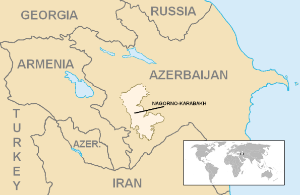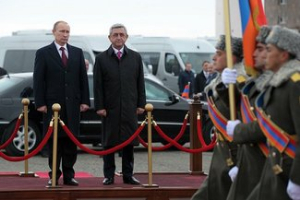Resurgence of the Nagorno-Karabakh Conflict - A Russian Move on the Ukraine Chessboard
By Avinoam Idan (09/03/2014 issue of the CACI Analyst)
The return of open fire in the Nagorno-Karabakh (NK) conflict recently brought about a meeting between the presidents of Azerbaijan and Armenia in Sochi, under the auspices of President Putin, on August 10, 2014. The growing tension in the conflict and the Sochi meeting take place against the background of the crisis in Ukraine. The Karabakh conflict serves as Russian leverage in influencing and promoting Russia’s geostrategic aims in the Caucasus and beyond, and Russia’s new initiative in the conflict meant to improve Russia’s stance in its confrontation with the U.S. and EU and its hegemony over the gateway to Eurasia.

Armenians Hope Sochi Meeting Will Relax Frontline Tensions
By Erik Davtyan (08/14/2014 issue of the CACI Analyst)
On August 10, a trilateral meeting took place between the presidents of Russia, Armenia and Azerbaijan. After the Kazan meeting in 2011, this was the first such meeting hosted by a Russian president. On August 8, Presidents Sargsyan and Aliyev had both paid a working visit to Sochi in order to discuss a wide range of issues, concerning Armenian-Russian and Azerbaijani-Russian relations respectively. Since both parties had expressed their willingness to hold a trilateral meeting, their official visits to Sochi presented a good opportunity for the dialogue between Armenia and Azerbaijan. The last meeting of the two presidents took place on November 19, 2013, in Vienna and was conducted with the participation of the Co-Chairs of the OSCE Minsk Group and the Personal Representative of the OSCE Chairman-in-Office Andrzej Kasprzyk.
The meeting focused on the situation in Nagorno-Karabakh, as well as the recent clashes on the Armenian-Azerbaijani border and the line of contact. While the working visit also pursued some other important issues (e.g. Armenian-Russian relations), the concerns among Armenia’s population over the events on the borderline and the possibility of a state-level discussion of that situation became the main point of interest during the trilateral meeting. Many Armenians attached great importance to the Sochi meeting due to the tense situation on the line of contact, which has since early August caused the deaths of over 20 soldiers. The recent skirmishes were the bloodiest fighting in two decades, and the proceedings at Sochi were therefore followed closely in Armenia.
In the first week of August, the developing situation on the frontline raised concerns among the Armenian public, fearing a possible escalation of the conflict. While clashes on the line of contact have occurred from time to time in past years, the massive breach of the cease-fire for a relatively long period of time, and the everyday news on the tense situation triggered perceptions that a return to large-scale military operations could be imminent. The death of 18 20-year-old soldiers in a week raised deep concerns among almost all Armenians, in Armenia as well as in the diaspora.
On August 7, President Aliyev’s military rhetoric on Twitter raised additional concerns in Armenia. Aliyev stated that Azerbaijanis “have beaten the Armenians on the political and economic fronts,” hence they “are able to defeat them on the battlefield.” These statements, which were actually made on the level of president, where received with a deep anger among Armenia’s population.
Both the borderline situation and Aliyev’s statements received reactions from Armenia’s Ministry of Foreign Affairs and were widely covered in Armenian mass media. Moreover, the international reactions to the events served to further underline the seriousness of the situation. The U.S. Department of State and the Russian Ministry of Foreign Affairs both expressed their stances towards the situation on the line of contact, which was one of the rare cases when the co-chairing states expressed their opinion not on the level of co-chairs, but foreign offices.
Russia’s mediation attempt was largely in line with the expectations of the Armenian public. Hence, most Armenians welcomed the chance for a meeting between the Armenian and Azerbaijani presidents. Despite the fact that Armenian society has an ambiguous attitude towards Russia and its relationship with Armenia, there was a relative unanimity towards the necessity of the Sochi meeting. Russia is considered to be Armenia’s strategic partner, and to secure part of Armenia’s state borders. Besides, Russia is one of the three members of the OSCE Minsk Group, as well as Armenia’s most significant arms supplier.
As the working visits of the Armenian and Azerbaijani presidents started on August 8, some Armenian experts are inclined to link that circumstance with the 6th anniversary of the August war between Russia and Georgia, thereby implying that there is an indirect message to Georgia’s neighboring states, Armenia and Azerbaijan. Nevertheless, the Sochi meeting drew the attention of Armenia’s population primarily due to its consequences for the acute situation on the frontline, rather than the prospects for approaching solutions to the Nagorno-Karabakh conflict itself. Therefore, this meeting, followed by a 10-month pause, largely satisfied the expectations of the Armenian public.
Russia Seeks Increased Control of Karabakh Resolution After Clashes Between Armenia and Azerbaijan
By Armen Grigoryan (08/14/2014 issue of the CACI Analyst)
After the recent clashes between Armenian and Azerbaijani forces, Russia’s leadership attempts to act more decisively in order to compromise the OSCE Minsk Group mediation efforts and to compel Armenia and Azerbaijan to accept Russia’s special role in the region. Russia’s proximity and strong influence over political elites and societies gives it an advantage over other Minsk Group co-chairs – the U.S. and France. However, the lack of security guarantees and economic perspectives may induce Armenia to start reviewing its attitudes concerning relations with different international actors and regional integration frameworks.

New Government Formed in Armenia
By Haroutiun Khachatrian (05/21/2014 issue of the CACI Analyst)
In April-May, 2014, a new government was formed in Armenia and about half of the former ministers lost their posts. However, the principal targets of the new government, headed by the new Prime Minister Hovik Abrahamyan, seem identical to those of its predecessor. The ruling Republican Party of Armenia declared its ambition to remain the leading political force at least until 2025.
On April 3, 2014, Tigran Sargsyan, the 12th Prime Minister of post-Soviet Armenia, resigned after six years in office. According to the official statement, he resigned due to personal reasons but several observers believe that the true reason was the decision of the Armenian Constitutional Court, according to which many articles of the Law on cumulative pension system presented by Sargsyan’s government contradict Armenia’s Constitution. Meanwhile, President Serzh Sargsyan is greatly interested in introducing this system and the Court’s decision was made public one day before the PM’s resignation.
On April 13, Abrahamyan, the 56 year-old Chairman of the National Assembly and a member of the Republican Party, was appointed the new PM by a presidential decree. Whereas the previous PM is a well-educated economist – Sargsyan was the chairman of Armenia’s Central Bank for ten years – Abrahamyan is a political leader. His previous carrier includes posts such as city mayor and governor, and he was a minister of territorial governance and deputy PM in a previous government.
Although nothing was formally changed as Sargsyan, a vice-president of the ruling Republican Party, was replaced by another vice-president, Abrahamyan, the events will have political implications. Most prominently, the Orinats Yerkir (Country of Law) party, which has partnered with the Republican Party during the last six years, decided to leave the government. The official reason was that the candidacy of the party’s leader, Artur Baghdasaryan, was not even considered when choosing the new PM. Baghdasaryan who, in his own words, is a good friend of President Sargsyan, resigned as Secretary of Armenia’s National Security Council on April 25 and said he would likely take up a post as Board Chairman of the Collective Security Treaty Organization Academy.
All three ministers belonging to Orinats Yerkir, including the ministers of Agriculture, Sergo Karapetian, Emergency Situations, Armen Yeritsyan, and Urban Development, Samvel Tadevosyan, preferred to remain in the new government and were immediately excluded from the party. Whereas the former two became members of Abrahamyan’s government, Tadevosyan subsequently had to leave his ministerial seat.
Due to its prevalence in the National Assembly, the Republican Party was indifferent to the loss of its partner. It has formed the entire government of its own members or of non-partisans. Observers have expressed various opinions on why Orinats Yerkir decided to go into opposition, yet it was probably a strategic move ahead of the general elections in 2017.
Another political event occurring in parallel with the formation of a new government was President Sargsyan’s statement that he will not seek a third presidency, as he was certain that no person can lead Armenia more than twice. In his April 10 statement, Sargsyan also said, “I am the leader of the largest political force of the country, the Republican Party and it will continue … playing an important role … in the country”. In addition, the Republican Party spokesman Eduard Sharmazanov made a comment on April 30, indicating that although Sargsyan will no longer run for a top office, he will remain highly influential in Armenian politics since he is the leader of the strongest political party. The Republican Party expects this situation to continue at least until 2025. This is not unlikely, given the weakness of other parties.
The Republican Party suggested the head and spokesman of its parliamentary faction, Galust Sahakyan, to replace Abrahamyan as chairman of the National Assembly. Sahakyan, 66, will soon occupy this post. In accordance with the legislation, the formation of a new government under Abrahamyan was completed by May 3. Ten out of eighteen ministers working in former PM Sargsyan’s cabinet retained their posts, including Defense Minister Seiran Ohanyan and Minister of Foreign Affairs Edward Nalbandyan. New ministers appeared in the ministries of finance, economy, healthcare and some others. The most unexpected appointment was that of Gagik Khachatryan, the former head of the State Revenue Committee, to Minister of Finance. He thereby becomes the fifth person on that post since 2008, and his former Committee has been included into the ministry. Armen Muradyan, the head of a private hospital, became the Minister of Healthcare to replace Derenik Dumanyan, a recently appointed friend of President Sargsyan.
As indicated by President Sargsyan, the priorities of the new government include efforts to join the Customs Union, the introduction of a compulsory accumulative pension system, to continue educational reforms, and to improve the tax and customs duty systems, among others. The new PM Abrahamyan said he would work to complete the implementation of the cumulative pension system, which the former cabinet under PM Sargsyan failed to do – another indication of the urgency that President Sargsyan attaches to this reform.
Armenia's Increasing Dependence on Russia
By Armen Grigoryan (05/07/2014 issue of the CACI Analyst)
Armenia’s Russia-imposed self-isolation from the democratic international community continues and threatens to have economic and social consequences for the country. Russia is increasing its pressure in the South Caucasus, raising the specter of regional destabilization. While Russia already controls the most important sectors of Armenia’s economy, it seems set to reinforce its interests in the country so as to ensure that a fully dependent, loyal Armenia can constitute a tool for the projection of Russia’s political and military influence in the region. Russia’s overt attempt to fulfill its expansionist ambitions endangers the sovereignty of its neighbors, as well as regional stability and energy security.






